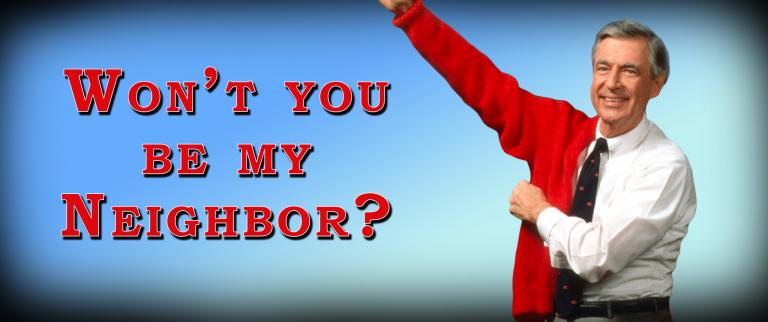A couple of months ago, Jeanne and I saw “Won’t You Be My Neighbor?”, the documentary about Fred Rogers that has already become the highest-grossing biographical documentary of all time. We tend to judge the movies we see based on the quality of conversation that we have about it on the way home. My first comment was “If Jesus came back to earth today, he would be Fred Rogers.” There are moral standards, and then there is Mister Rogers. The movie reminded me of another moral exemplar who once told an iconic story in response to the question “Who is my neighbor?”

I recently found myself in the midst of a Facebook discussion, the sort of online discussion that I try to avoid at all costs. The topic was same-sex marriage; in the middle of some testy back and forth between persons of vastly different beliefs and commitments, a former student with whom I am friends on Facebook, a young Muslim woman, posted this:
I honestly wonder – why are some religious folks so quick to condemn and oppose the legalization of same-sex marriage and yet lack a response of even a marginally close degree of intensity to such inequalities of wealth and resource that inevitably lead to world hunger and suffering – inequalities which their respective religious texts and prophets make clear to condemn and resist far more than to gay marriage? I am not seeking to belittle or invalidate anyone’s beliefs but am genuinely seeking to understand the difference in importance given to these issues – I would truly appreciate an answer to this, from anyone here.
For me, at least, that cut through a lot of the bullshit that had been e-flying around in previous comments. I posted the following in response:
Unfortunately, I think it is because what the great religions REALLY require of us is too hard. The prophet Micah wrote that what God requires of us is to “do justice, love mercy, and walk humbly with your God.” That’s a lot harder than taking positions on social issues that don’t cost anything. It’s very clear from reading Scripture that the measure of our journey with God is how we treat the poor, the needy, the disenfranchised, the suffering–not the positions we took on same-sex marriage, or abortion, or how often we were in church.
Or, I might add, the proper moral attitudes toward the caravan of refugees inching its way through Mexico toward our southern border.
All of this is placed in sharp focus by a very familiar story. Is there any of Jesus’s parables more familiar than The Good Samaritan? And is there any parable whose message is more impossible to live out? Jesus uses the story to illustrate mercy, the second of Micah’s directives for following God, agreeing with the man who concludes that the true neighbor in the story was “the one who showed mercy.” I’d like to reflect on the Good Samaritan story with the last of Micah’s directives in view: Humility.
On its face, humility is not a popular virtue; indeed, self-effacement, being a doormat, deference to others—all popular synonyms for humility—seem more like vices than a virtue. Humility is not included in Aristotle’s famous list of virtues, and philosophers for millennia have struggled with humility, often ignoring it or altogether denying that it is a virtue. One contemporary philosopher suggests that humility “seems at best a saving grace of the mediocre and at worst an excuse for passivity towards human wrongs.” It certainly doesn’t fit comfortably with the dominant American notions of independence, individuality, and aggressive achievement. And yet one can scarcely read a page of the Psalms or the New Testament without encountering calls for humility. So what exactly is being called for?
In the Good Samaritan story, the priest, the Levite, and the Samaritan all see the man beaten, robbed, and left for dead in the ditch. And yet their manner of seeing is very different. The story says that in the case of both the priest and the Levite, “when he saw him, he passed by on the other side.” I have heard and read many explanations, theories, and accounts of why these religious guys walked on by; the most common is both the priest and Levite assumed that the man was dead and did not want to violate the many prohibitions in the Law against those who handled holy things for a living touching anything dead. In other words, the priest and the Levite saw the injured man through the lenses of their societal roles and commitments. They saw the injured man with the eyes of the self.
“But a Samaritan while traveling came near him; and when he saw him, he was moved with pity.” If the Samaritan had chosen, as the priest and the Levite did, to see the injured man through self-defining lenses, he also would have walked on by. Travelling on the road between Jerusalem and Jericho, the Samaritan was in enemy territory—Samaritans and Jews had nothing to do with each other. They were “Others” to each other. The man in the ditch was almost certainly the sort of person that the Samaritan had been taught to hate. The Samaritan is on a journey, undoubtedly in a hurry, with miles to go before he sleeps—why does he stop and allow his agenda to be seriously disturbed? What does he see that the priest and the Levite did not see?
As simple as it sounds, the Samaritan stopped because he saw the injured man unfiltered. Simone Weil calls this ability to see unfiltered “attention,” and suggests that it is at the heart of true human connection. “Those who are unhappy have no need for anything in this world but people capable of giving them their attention. The capacity to give one’s attention to a sufferer is a very rare and difficult thing; it is almost a miracle; it is a miracle.” Another word for this miraculous ability to see unfiltered, to attentively look at what is in front of me unencumbered by my usual filters and agendas, is humility. And it is at the heart of true faith.
And this, I believe, is why defining ourselves morally in terms of positions taken on hot button issues is far more attractive than actually attempting to live a life guided by what the texts and principles of one’s faith actually demand. As Simone says, true attentiveness—true humility—is a miracle. Human beings are not naturally wired in this way. Iris Murdoch notes that “we live in a dream, we’re wrapped up in a dark veil, we think we’re omnipotent magicians, we don’t believe anything exists except ourselves. Our attachments tend to be selfish and strong, and the transformation of our lives from selfishness to unselfishness is sometimes hard even to conceive of.” This is what makes the Good Samaritan miraculous—he is able to truly see what is front of him and respond directly without a moment’s concern for anything other than what this man needs.
Iris Murdoch defines love as “the extremely difficult realization that something other than oneself is real.” Love and humility, in other words, go hand in hand. Love and humility energize the apprehension of something else, something particular, as existing outside us. In our daily lives we are continually confronting something other than ourselves. We all, not only can but have to, deal with the resistant otherness of other persons, other things, history, the natural world, and this involves a perpetual effort. But at the heart of the Christian faith, illustrated by the parable of the Good Samaritan, is the promise that the possibility of transformative love and humility is in each of us, ready to be introduced into the world if we will only look away from ourselves toward what is directly in front of us.
We are called to cultivate Good Samaritan moments—moments in which the human being in front of us is not dark-skinned, poor, female, gay, disabled, conservative, wealthy, Muslim, male, straight, ugly, liberal, old, Christian, obese, or attractive, but rather is a person whose needs, hopes and dreams are real and independent of us. It is a task to come to see the world as it is, a task that can only be attempted with the miraculous energy of humility. When I believe that I have seen all there is to see, the Christ in me says “let me look again.”
Which makes me wonder–are the people in the caravan inching its way toward the United States from the south my neighbors? Stay tuned!












